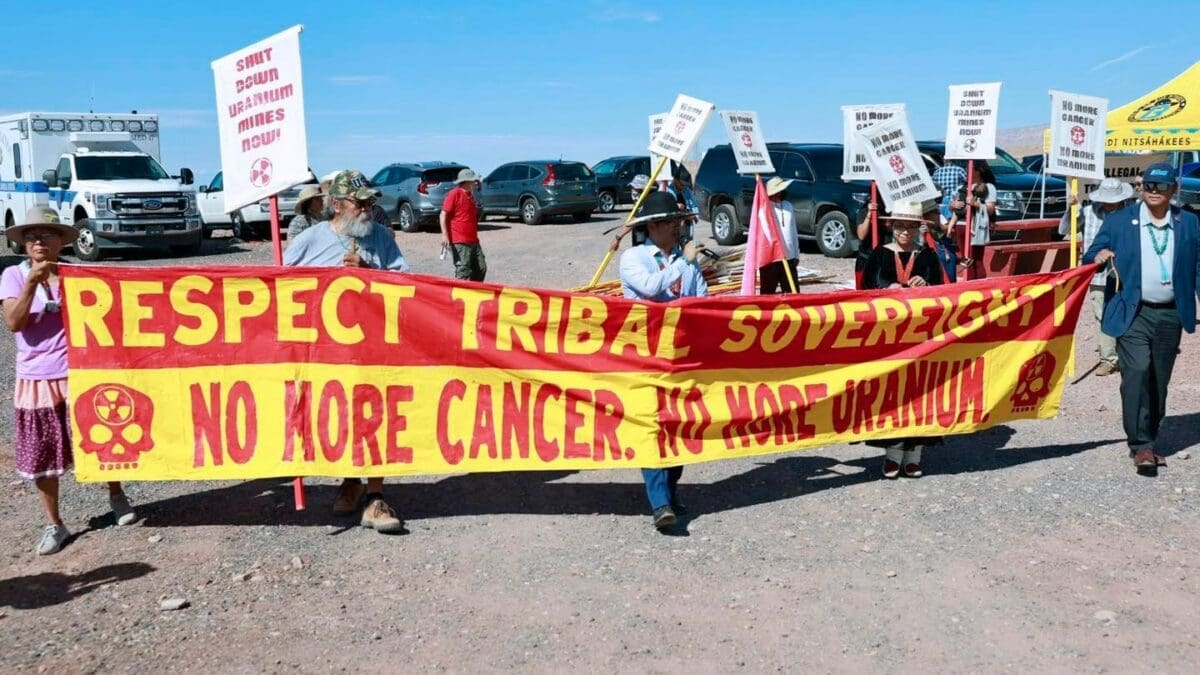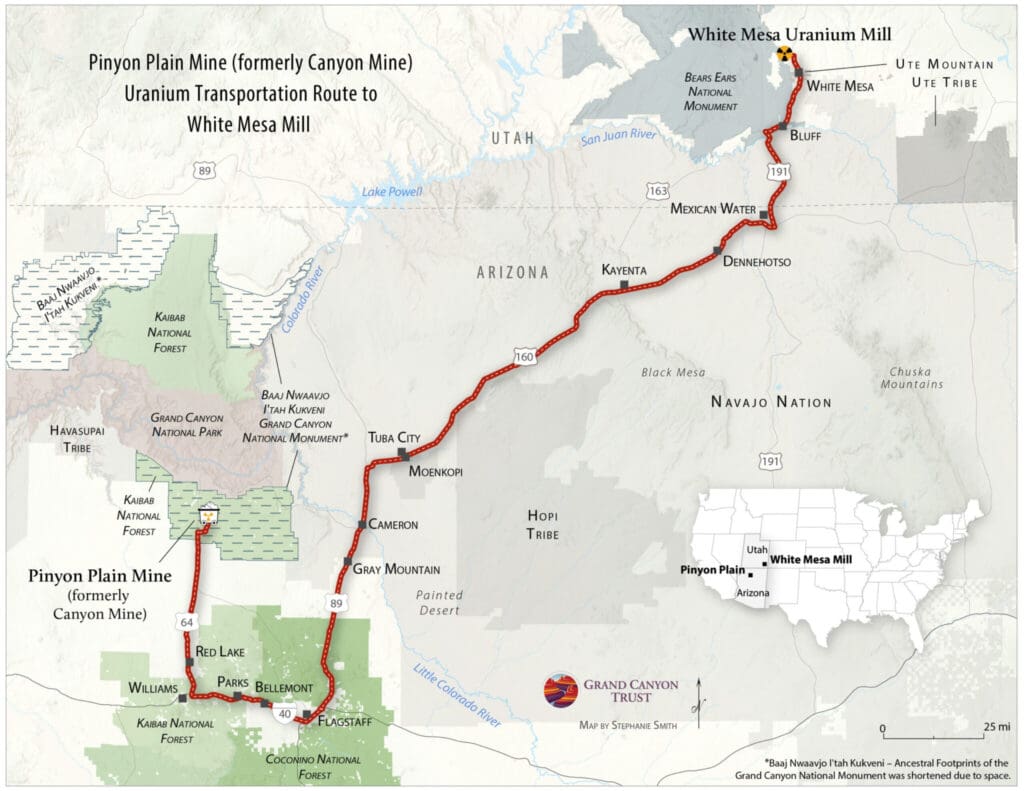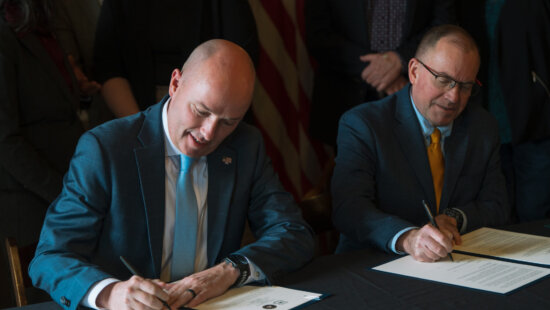Health
Navajo Nation, Havasupai Tribe condemn transportation of uranium ore on tribal land

Navajo Nation President Buu Nygren marched with protestors on Aug. 2, 2024, in Cameron, Arizona, to oppose the transportation of uranium across Navajo land. Photo: Navajo Nation Office of the President
Written by Shondiin Silversmith, Utah News Dispatch
Tribal leaders from the Havasupai Tribe and Navajo Nation were led to believe that Energy Fuels Resources, Inc., would give their communities two weeks’ notice before they started hauling uranium ore from Pinyon Plain Mine near the Grand Canyon.
However, that wasn’t the case when Navajo Nation President Buu Nygren and the Havasupai learned on July 30 that two trucks hauling uranium ore were already en route to the uranium mill in Utah.
“They snuck through the Navajo Nation,” Nygren said.
By the end of the day, Nygren was informed that two trucks carrying uranium ore from the Pinyon Mine had passed through the Navajo Nation and reached Utah.
“They operated covertly to travel (through) the Navajo Nation illegally,” Nygren said. “They smuggled uranium across our nation, which is very inappropriate.”
Energy Fuels Resources, Inc. (EFRI), the owner of Pinyon Plain Mine, started transporting uranium ore from the mine near the Grand Canyon to the White Mesa Mill in Blanding, Utah, on July 30.
The transportation routes to move the uranium from the Pinyon Plain Mine go through several tribal communities, including lands of the Navajo, Hopi, Havasupai and Ute Mountain Ute.
“Pinyon Plain Mine owners have strategically taken steps to attack the sovereignty of the Havasupai Tribe and neighboring Tribes,” the Havasupai Tribe said in a written statement. “Despite our continuous opposition, Energy Fuels Resources, Inc. has once again acted in its own self-serving interest by beginning to haul uranium ore on public roads, through our ancestral lands, and into the Navajo Nation.”
The Havasupai Tribe said that Energy Fuels Resources promised months ago to give the Havasupai, neighboring tribes, the U.S. Forest Service and other stakeholders two weeks’ notice before hauling the uranium ore to the processing mill in Utah.
The tribe said it relied on the good faith promise of EFRI to provide the notice, but “EFRI blatantly disregarded its good faith promise and notified the U.S. Forest Service hours after the haul trucks departed the mine site.”
EFRI has demonstrated by its actions that it cannot be trusted, the Havasupai Tribe said.
The tribe has opposed uranium mining in and near the Grand Canyon for generations and has been vocally opposed to the operation of the Pinyon Plain Mine and have been trying for decades to shut it down.
“Our purpose of opposing uranium mining remains for the protection of our drinking water and the health and safety of our Tribal members and tourists who visit our reservation,” the tribe said.
Pinyon Plain Mine started operations again in December 2023 due to the high demand for uranium. By Jan 8, EFRI notified the Kaibab National Forest that it had extracted uranium ore from the Pinyon Plain Mine and placed it on an ore pad, according to the U.S. Forest Service. This was the first time uranium ore had been removed from the mine.
“The Havasupai Tribe does not stand alone in our fight against uranium mining, and we will continue to offer our support to the Navajo Nation,” the tribe said. “The Havasupai Tribe strongly condemns EFRl’s actions, and we will continue to fight against both the mining and transportation of uranium anywhere within our aboriginal territory.”

The trucks’ route enters the Navajo Nation at Grey Mountain and passes through multiple Navajo communities, including Cameron, Tuba City, Kayenta and Mexican Water.
The legacy of uranium mining has harmed the Navajo Nation for decades, from abandoned mines to contaminated waste disposal.
From 1944 to 1986, nearly 30 million tons of uranium ore were extracted from Navajo lands, according to the EPA, and hundreds of Navajo people worked in the mines, often living and raising families near the mines and mills.
“The Navajo Nation has sacrificed so much for this country through the mining and processing of uranium ore extracted from our lands,” said Navajo Nation Council Delegate Casey Allen Johnson, who represents Cameron Chapter, one of the communities along the truck’s route.
“Energy Fuels Resources is threatening the lives and health of our people by transporting uranium across our land,” Allen added.
Between the 1940s and 1990s, thousands of uranium mines operated in the United States, according to the United States Environmental Protection Agency. Most operated in Colorado, Utah, Wyoming, New Mexico and Arizona, typically on federal and tribal lands.
The number of mining locations associated with uranium is around 15,000, according to the EPA, and of those, more than 4,000 have documented uranium production.
“Our Navajo people have suffered for many years, and many lost their lives due to uranium mining on our homelands,” Navajo Nation Council Speaker Crystalyne Curley said, adding that the council strongly condemns the actions of Energy Fuels Resources.
“The Navajo Nation will continue to oppose and fight against the transportation of uranium ore through our lands for the health and safety of our people,” Curley added,
In response to EFRI’s transportation of uranium ore across the Navajo Nation, Nygren issued an executive order on July 31 that will require an agreement to be put in place before the transportation of radioactive material through the tribe’s land.
The executive order will be in place for six months.
Nygren said the tribe is doing so because it is his job as president to enforce the laws on the Navajo Nation to ensure the safety of the Navajo people and respect for Navajo sovereignty.
The Navajo Nation outlawed the transportation of uranium ore through their homelands over a decade ago as part of the Navajo Nation’s 2012 Radioactive and Related Substances, Equipment, Vehicles, Persons, and Materials Transportation Act.
The law prohibits the transport of uranium mining products within the Navajo Nation unless it complies with the transportation notice and other requirements.
The tribe said that EFRI did not notify Navajo Nation officials of the transportation of an estimated 50 tons of uranium mine ore through the tribe’s lands.
Nygren said the company’s failure to seek approval from the Navajo Nation for transporting radioactive materials across its land disregards the nation’s governmental authority and sovereignty.
“If you’re going to smuggle uranium into our borders and across our nation and outside, that’s pretty much illegal,” he added. “I’m very disappointed that this is happening in this day and age.”
The Havasupai Tribe and Navajo Nation have called upon state and federal leaders to support their efforts to halt the transportation of uranium ore through tribal lands.
The Arizona Attorney General’s Office was informed of the uranium ore transportation on July 31. Attorney General Kris Mayes said that her office is researching options and remains committed to doing everything in her power to protect the health and safety of all Arizonans.
“Hauling radioactive materials through rural Arizona, including across the Navajo Nation, without providing notice or transparency and without providing an emergency plan is unacceptable,” she added.
Gov. Katie Hobbs said in a statement that she has been communicating with the Navajo Nation and EFRI as they navigate the situation.
“My administration worked with EFRI to voluntarily agree to pause ore shipments through Navajo lands to give both sides an opportunity to engage in good faith negotiations,” Hobbs said.
“I have also instructed (the Arizona Department of Emergency and Military Affairs) to partner with tribal law enforcement and assist the Navajo Nation’s emergency management team in developing an emergency response plan in the event of a road incident,” she added.
Hobb said her administration had asked EFRI to engage in ongoing discussions with stakeholders about the safety concerns surrounding the Pinyon Plain Mine and uranium ore transport. They have agreed, she said.
“My hope is that these steps and good-faith negotiations between both parties during the temporary pause will bring an acceptable solution,” she said.
Arizona Mirror is part of States Newsroom, a nonprofit news network supported by grants and a coalition of donors as a 501c(3) public charity. Arizona Mirror maintains editorial independence. Contact Editor Jim Small for questions: info@azmirror.com. Follow Arizona Mirror on Facebook and X.



















